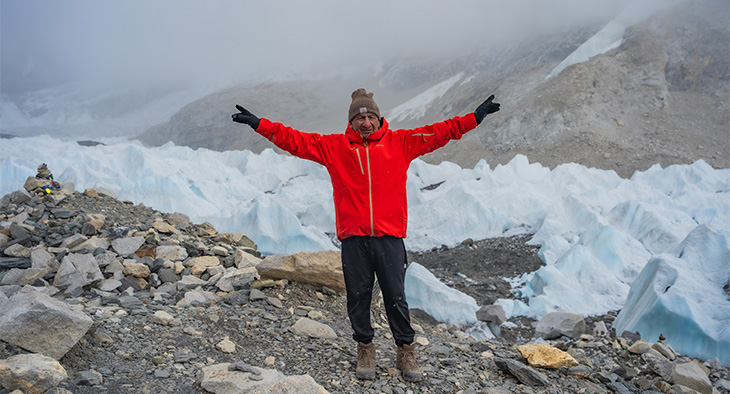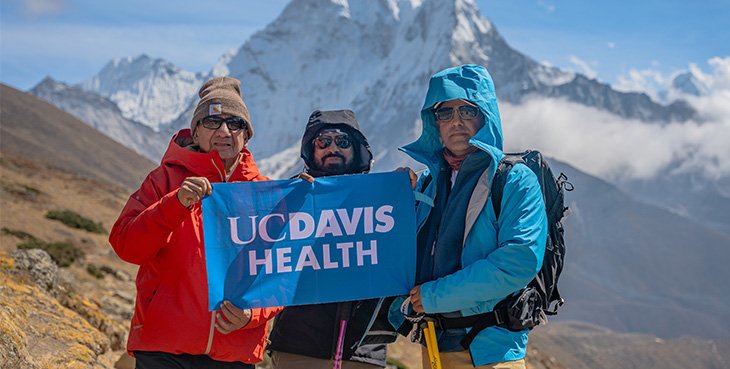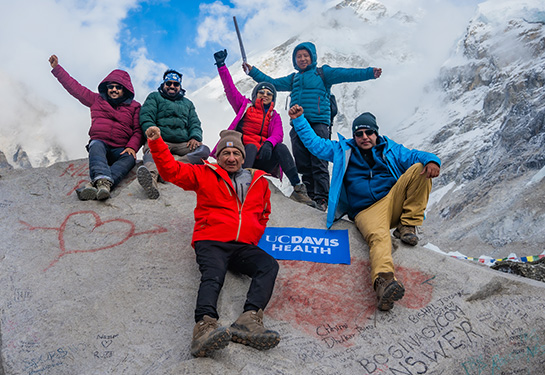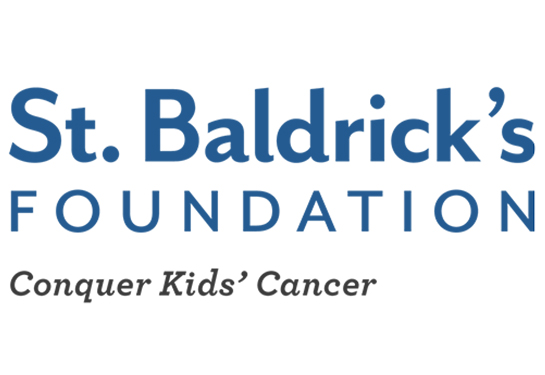UC Davis Health flag travels with grateful patient on challenging trek to Mt. Everest
Story inspires hope during Bladder Cancer Awareness Month as medical team helps make a dream come true.
May is Bladder Cancer Awareness Month, shining attention on one of most common types of cancer. Symptoms can include changes in bladder habits, blood in the urine, lower back pain on one side, fatigue, swelling in the feet and even bone pain. Early detection is key, so it is important to see your doctor if you have any of these symptoms.
Fortunately, UC Davis Comprehensive Cancer Center, turns to advanced options for treating bladder cancer, including immunotherapy and clinical trials. One such success story is Ruben E. Muñoz. He didn’t just seek the latest treatment for his bladder cancer — he also sought help realizing his dream quest of trekking to Mount Everest.
Cancer center medical team helps turn dream into reality
Muñoz, a retired computer engineer from Elk Grove, always dreamed of visiting Mount Everest, located in the Himalaya mountain range between Nepal and Tibet. Rising 29,000 feet into the atmosphere, it is the tallest point on Earth. More than 300 people have died attempting to climb its treacherous terrain.
At first, his cancer center doctors expressed doubt and concern about the trip.
“I told my doctors that the trek was not to the peak, but to the base camp of Mount Everest, which rests at 18,000 feet, but that didn’t seem to change their minds,” Muñoz said. “I was in treatment for stage 4 bladder cancer, and they thought I was crazy. Family and friends expressed the same level of concern. I told everyone, ‘Then send me to a psychiatrist because I’m going!’”
When it appeared obvious that the 68-year-old Muñoz was not backing down, his oncologist, Mamta Parikh, and other doctors, decided that if they couldn’t stop him from climbing Mount Everest, they would do all they could to support him and make sure that he survived the trip.
There were some hitches along the way.
“As Mr. Muñoz had a remarkable response to clinical trial therapy initially, we kept having the conversation about when the hike might become a reality,” Parikh said. “Unfortunately, when he had to discontinue the trial treatment due to side effects, the cancer spread, again, and he had to delay the trip so he could try a second immunotherapy combination.”

Quest to Mount Everest continued
Muñoz never gave up hope that he could make the journey to Mount Everest and his positive spirit prevailed. The second immunotherapy treatment brought his bladder cancer under control. As his cancer retreated, his plans for the hike advanced. Family and friends supported him with positive thoughts and prayers, and his doctors helped prepare him for the trek.
“While he knew the risks, he felt this was his chance,” Parikh said. “To support him as best as I could, we set up hydration appointments for him and paused treatment a few weeks before his planned trip. We also sent some steroids with him just in case he developed side effects while he was hiking.”
Cardiology resident Colin McNamara ordered an altitude test to check Muñoz’s tolerance for reduced oxygen at high elevations. McNamara also prescribed medication for altitude sickness and cholesterol drugs to lower Muñoz’s risk of a heart attack. UC Davis Health pediatrician and personal friend Erik Orlando Fernandez y Garcia also rallied behind Muñoz in preparation for the trip.
Waving gratitude with a UC Davis Health flag
Muñoz had one more request for his doctors: He wanted a UC Davis Health flag to take with him to Mount Everest. His doctors came through, working with the UC Davis Health marketing team, which created a custom flag for the trip.
“I am so grateful for the care I’ve received. The trip to Mount Everest would never have happened if not for my medical team, and I wanted to make sure a part of UC Davis Health came with me, which is why I asked for the flag,” Muñoz explained.
Most of the time, he draped the flag across his shoulders and back as he hiked. Sometimes, though, the flag took center stage in group photos with sherpas (Tibetan mountain guides) and hikers Muñoz met along the way. The flag also found its way onto giant boulders and became part of the foreground in many views of Mount Everest’s stunning snow-capped peak.
“When Mr. Muñoz sent us the picture of the UC Davis flag at the Mount Everest Base Camp, it was truly moving,” Parikh said.
Not only did Muñoz complete the trip, but he felt immense joy during the adventure and physically felt wonderful.
“It was an awesome experience,” he said. “My body handled the change of altitude in an amazing way and I was able to enjoy the trek from beginning to end.”

A hardy soul with a passion for taking on big dreams
“Personally, I always believe we need to continue enjoying our lives even with the adversity of life-changing experiences like cancer,” Muñoz said.
He is not one to shy away from challenges or ignore his ambitions. Always athletic, by the time he was in his teens he was a track and soccer star in his native country of Peru. Muñoz wanted to explore beyond his hometown of Lima and followed his dreams of life in the United States, emigrating when he was 23.
“I wanted to leave Peru to complete my college education, participate in college sports and get reunited with my family,” he explained. “My parents, Christian ministers, were already living in this country. I thank them for teaching me the power of prayer and [about] having faith in God.”
Muñoz enrolled in California State University, Sacramento, pursuing the burgeoning field of computer science in the late ’80s. He took on another challenge 20 years later. California was opening the first competitive market for electricity in the country, based on an electronic marketplace that traded energy. Muñoz became one of the architects of the early computer infrastructure of the California Independent System Operator (Cal ISO), which also maintains electric reliability for most of the statewide power grid.
“Stress is something that came with the job,” Muñoz said. “One way to relieve the stress was to form a hiking group with friends at the Cal ISO.”
The Fight or Flight hiking group is made up of eight coworkers. The two women and six men put together the trek to Mount Everest base camp.
“We called it ‘Team Fight or Flight Road Trip to Everest’ because when I was diagnosed with bladder cancer in 2019 hiking became harder. We trained on Auburn and Tahoe trails, and I’d feel sick for first 15 minutes of the hike, and then shift into what I called, ‘Fight or Flight’ and feel great,” Muñoz said.
Two years after his diagnosis, Muñoz retired from the Cal ISO but continued to hike with his former colleagues — and prepare for the experience of a lifetime. They scheduled the Mount Everest hike for October 2023.
An unequalled experience
Generally, hiking to the first base camp at the foot of Mount Everest requires sound physical and mental fitness due to its high altitude, steep trails and harsh weather conditions. Even the most fit individuals are urged to boost their stamina before the trip.
Each day on the climb brought new challenges and scenery. And each day brought Muñoz new joys and an understanding of how people lived in the surrounding environment. Muñoz said keys to the trip’s success included good nighttime rest, adequate hydration, pacing yourself well and doing what the group’s guide called “walking the mountain.”
Muñoz explained: “That means to make the same effort on every step, going uphill, downhill or on flat surface, just like the natives do.”
Camaraderie among hikers on the trail also was important. Muñoz said the sense of a shared goal, among everyone in the quest together, allowed people to connect with each other on a much deeper level than if they met elsewhere or under different circumstances.
Returning home
“At the end of the day, we are here to serve our patients and, whenever possible, help them meet goals which are meaningful to them,” Parikh said. “When Mr. Muñoz returned, we were so relieved to find on his most recent scans that his cancer remains under control."
Months after his expedition, Muñoz continues to hike with his Cal ISO friends. He also plays and coaches soccer.
“I believe you don’t stop living just because you have cancer,” Muñoz said. “I told my doctors I’d rather live a whole year fully, doing activities I enjoy, than live 10 years in a bed.”
UC Davis Comprehensive Cancer Center
UC Davis Comprehensive Cancer Center is the only National Cancer Institute-designated center serving the Central Valley and inland Northern California, a region of more than 6 million people. Its specialists provide compassionate, comprehensive care for more than 100,000 adults and children every year and access to more than 200 active clinical trials at any given time. Its innovative research program engages more than 240 scientists at UC Davis who work collaboratively to advance discovery of new tools to diagnose and treat cancer. Patients have access to leading-edge care, including immunotherapy and other targeted treatments. Its Office of Community Outreach and Engagement addresses disparities in cancer outcomes across diverse populations, and the cancer center provides comprehensive education and workforce development programs for the next generation of clinicians and scientists. For more information, visit cancer.ucdavis.edu.




